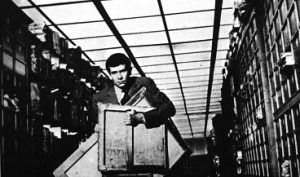
Jorge Luis Borges is, no doubt, one of the writers who has best succeeded in reflecting infinity in his literary work. In fact, he entitled one of his collections of short stories The Aleph; and at the end of the last story, the one that gives the title to the entire collection, Borges wrote: “Two observations I would like to add: one, about the nature of the Aleph; the other, about its name. This, as is known, is the first letter of the alphabet of the sacred language […]; for the Mengenlehre, it is the symbol of transfinite numbers, in which the whole is not greater than some of the parts”. Mengenlehre is, of course, Cantor’s theory of sets; the term appears in the title of the last work that Cantor published on infinity: Beiträge zur Begründung der transfiniten Mengenlehre (Contributions to the Foundations of Transfinite Set Theory), and in the book that Hausdorff published in 1914: Grundzüge der Mengenlehre (Foundations of Set Theory).
Another example: in his article The Metaphor (1934), included in History of Eternity (1936), Borges set Nietzsche’s finite hypotheses against Cantor’s infinities, giving the latter a clear advantage. However, Borges possibly did not know that it was Richard Dedekind the author of the definition of infinity as a whole that is not greater than some of its parts. This definition appears explicitly in the above quotation from The Aleph; also in The Metaphor, where Borges implicitly attributes it to Cantor. The Argentine writer’s apparent confusion could be explained as follows: Borges reviewed Eric Temple Bell’s Men of mathematics for El hogar de Buenos Aires (July 8, 1938) – a collection of short and somewhat imprecise biographies of famous mathematicians. Men of mathematics includes a biography of Dedekind, although there are no references to his definition of infinity; it also includes a biography of Cantor where Bell referred to Dedekind’s definition of infinity but attributed it implicitly to Cantor. By the way, through that biography of Cantor, Bell contributed greatly to the diffusion of the myth that associates Cantor’s mental illness with his messes with infinity (see the entry Cantor and madness). I think I see in The zahir –another story included in The Aleph– echoes of that vision of Cantor’s madness in the one triggered by the coin on the main character of that story.

Some of Franz Kafka’s novels also give off the disturbing smell of infinity, with that endless succession of days or nights, as if in a nightmare, with that haunting possibility that such a reiteration of apparently invariable, unreal events has no end.
Although, as I see it, there is a clear difference between the infinities reflected by Borges and Kafka in their stories and novels: Kafka’s infinity would correspond to Aristotle’s infinite potential, while Borges’ would be more like Cantor’s infinity in action. It should be remembered that Aristotle distinguished between what can potentially be infinite because it has no limits and what is really infinite; the first concept, potential infinity, was something admissible to reason about, while infinity in action was forbidden by Aristotle because it was a paradoxical concept.
The fact that Kafka reflects the infinite in potential, the one allowed by Aristotle, does not alter the fact that the reading of Kafka, when the temporal succession is lost in an infinite labyrinth, does not cease to displease the spirit. In my case, this eerie presence of what has no end makes the reading of Kafka’s apparently boring novels more bearable.
The trial is among the ones I find most disturbing. The main character, Joseph K., is involved in a legal process that is absurd and unrealistic, but which becomes increasingly complicated: the world of justice appears to be vague and nebulous, where an ever-increasing number of lawyers must be hired –infinite one would say. This infinity was also masterfully portrayed by Orson Welles in the movie he directed about the novel in 1962; in a certain scene we are shown inside the courts, where there are endless rows of mailboxes. Joseph K.’s file has to go through all the mailboxes, one by one; however many mailboxes he has already gone through, there will always be one more mailbox where the file will have to go. That is the potential infinity, and, alas, perhaps also the judiciary reality.

And what about The Castle? It is certainly the novel where Kafka best reflects the infinite iteration of days. In it, the main character, K., is hired as a topographer in a land dominated by a castle. However, his work is hampered by ambiguous prohibitions and events that continue ad infinitum, without end… And never better, since Kafka died before finishing the novel, which was incomplete, unfinished… Exactly as Aristotle said that it happened to the infinite potential.
On the other hand, the infinite that Borges’ pen distilled is not in potential but in act… precisely the kind of infinite that Aristotle forbade. Although I will deal with this in the next entry.
References
A.J. Durán, Pasiones, piojos, dioses… y matemáticas, Destino, Barcelona, 2009.

Muy bueno!